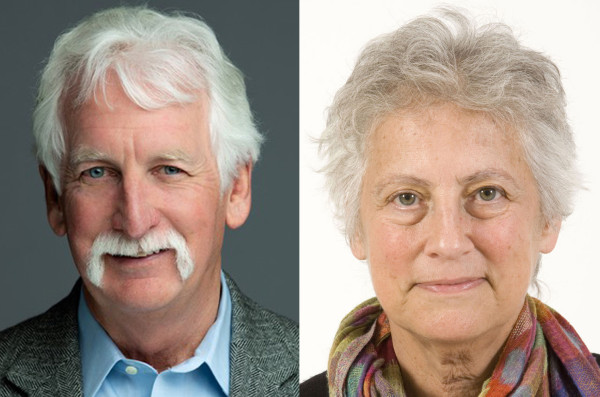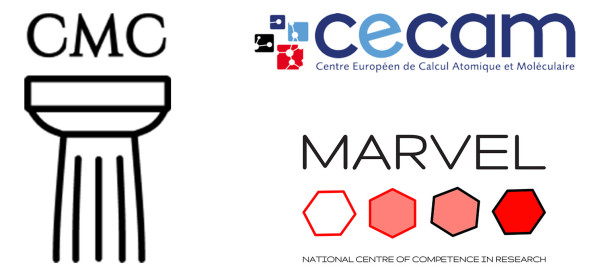CECAM-MARVEL Classics in molecular and materials modelling: Bill Jorgensen and Shoshana Wodak
Zoom link:
https://epfl.zoom.us/j/69257486494?pwd=ZUw4a1J2YmNlNXNiOVBaOTdIWWRUdz09
In this series, methods that have become fundamental tools in computational physics and chemistry are presented by their originators at a level appropriate for master and graduate students. The lectures are followed by an interview: we ask our guests to recall for us the period, problems, people and circumstances that accompanied the creation of milestone methods and algorithms that we now routinely use.
Join us to share this exciting opportunity to learn first-hand from our pioneers and get to know better the genesis of work that is now recorded in books!
Program
Methods for computational biology and drug discovery
15:00 — Introduction
15:05 — "Evolution of free-energy calculations from butane to drug discovery" (talk by Bill Jorgensen)
15:45 —"Modeling protein-protein interactions: then and now"(talk by Shoshana Wodak)
16:25 — Break
16:35 — Interview and recollections
17:30 — End

Abstracts
Evolution of free-energy calculations from butane to drug discovery
Bill Jorgensen
Yale University
Free-energy calculations have had a revolutionary effect on computational chemistry. In conjunction with molecular dynamics and Monte Carlo simulations, they have enabled the calculation of free energy changes for wide-ranging phenomena including fundamental solution thermodynamics, solvent effects on equilibria, activation barriers for reactions in solution, host-guest binding, and drug lead optimization. An overview of our free energy efforts starting in 1981 with umbrella sampling for conformational equilibria, continuing to the FEP calculations in 1985 for the ethane to methanol mutation, and leading to recent discoveries of extraordinarily potent inhibitors of the main protease of SARS-CoV-2 will be presented.
Modeling protein-protein interactions: then and now
Shoshana Wodak
Flemish Free University of Brussels
I’ll describe the birth of protein-ligand and protein-protein docking methods developed in 1974-1978 and their application to the elucidation of the quaternary structure change in hemoglobin ten years later. This will be followed by an overview of the progress achieved in modeling protein-protein interactions during the last 5 decades. This overview will highlight the important role of community-wide blind prediction experiments in nurturing the field. It will discuss the recent breakthrough in the accurate prediction of single protein chains driven by deep learning methods, illustrating the advances this enables for the prediction of protein-protein interactions, and outlining important remaining challenges.
About the speakers
Bill Jorgensen has been on the faculty at Yale since 1990, where he is the Sterling Professor of Chemistry. Bill's research has covered both computation and experiment. He has combined quantum, statistical, and molecular mechanics to model chemistry in solution. He has been a leader in computational studies of organic and enzymatic reactions in solution, molecular recognition, protein-ligand binding, and molecular properties. His OPLS force fields and TIPnP water models are widely used. Bill’s research group has also pursued de novo drug design, synthesis, and protein crystallography, particularly for anti-infective, anti-proliferative, and anti-inflammatory agents. He pioneered the use of free-energy perturbation calculations for widespread applications including efficient drug lead optimization.
Among honors, Bill has received the ACS Award for Computers in Chemical and Pharmaceutical Research, the ACS Hildebrand Award, AAAS and ACS Fellowships, the ISQBP Award in Computational Biology, the Sato International Award from the Pharmaceutical Society of Japan, the Tetrahedron Prize, and the Arthur C. Cope Award. He has been elected to membership in the International Academy of Quantum Molecular Science, American Academy of Arts & Sciences, and US National Academy of Sciences. He was the Editor of the ACS Journal of Chemical Information and Modeling during 2004-2013 and the Journal of Chemical Theory and Computation from its founding in 2005 through 2021.
Shoshana J. Wodak earned her PhD at Columbia University, New York, under the supervision of Cyrus Levinthal, who was developing what were then the first and most powerful computational and graphics tools for modelling proteins and protein interactions. Importing and implementing many of these tools to Belgium and France in the late seventies (with crucial support from CECAM (Centre Européen de Calcul Atomique et Moléculaire) in Paris and EMBO), she developed, in collaboration with Joel Janin, the first docking algorithms for the prediction of protein-protein interactions and one of the first procedures for defining structural domains from the atomic coordinates of proteins. With her team at the Free University of Brussels she then used molecular simulations and bioinformatics approaches to investigate the role of local interactions in stabilizing the native state of proteins, protein structure prediction, protein folding, and fold recognition. Together with her teams at the Free University of Brussels, the European Bioinformatics Institute in Hinxton, UK, and at the Hospital for Sick Children in Toronto, she developed efficient procedures for computational protein design, for simulating protein interactions and conformational changes, and for analyzing protein interactions networks and cellular pathways.
Between 1986-1993, Dr. Wodak was the Scientific Director of the protein engineering team at Plant Genetic Systems, Belgium (now part of Bayer CropScience). Among their success stories was the engineering of more thermostable versions of the xylose (glucose) isomerase enzyme, changing its metal specificity, and pH profile.
Dr. Wodak founded and co-directed the Centre for Structural Biology and Bioinformatics and headed a Master’s program in Bioinformatics. She has been a member of the European Molecular Biology Organization (EMBO) since 1990. She held a Tier 1 Canada Research Chair in Computational Biology and Bioinformatics from 2005-2012 and was elected an ISCB fellow in 2016. She is a member of F1000 since 2017.
Dr. Wodak has been a member of numerous expert panels and Advisory Committees in Europe (ERC, Horizon 2020), US (DOE) and Canada (CIHR), and is on the Editorial Boards of several journals her field.
Since 2001, Dr. Wodak serves on the Management Committee of CAPRI (Critical Assessment of Predicted Interactions), a community-wide international initiative for fostering the development of methods and algorithms for the prediction of protein interactions and complexes, and has been coordinating this effort, since 2013.
Dr. Wodak is currently a Visiting Group Leader at the VIB-VUB Structural Biology research Centre, at the Flemish Free University of Brussels, Belgium. She is a member of the Executive Committee of the Elixir 3DBioInfo Community and serves on the Scientific Advisory Board of Cyclica Inc. in Toronto Canada.

Previous CECAM and MARVEL lectures can be found at:
https://www.materialscloud.org/learn/sections/Btmngu/marvel-events
https://www.cecam.org/lectures
Low-volume newsletters, targeted to the scientific and industrial communities.
Subscribe to our newsletter